In Garrity v. New Jersey (1967), one of the most remarkable decisions of the Warren Court, a 5–4 majority of justices said public employees cannot be found guilty of crimes based on their admissions in disciplinary interviews conducted as a condition of employment.
Justice Harlan, writing in dissent, said the majority had fundamentally misunderstood the nature of the constitutional right against compelled self‐incrimination. The relevant scope of “involuntary as a matter of law,” in his view, should be seen to reach only situations of actual legal compulsion, not those in which the price you pay for declining to speak frankly about how you behaved on the job is that your employer might not want to keep you on its payroll.
Garrity has become a key element of legal weaponry for public employees and their unions seeking to minimize consequences for on‐duty misbehavior. (Although the original setting was one involving police officers, the decision applies broadly to public employment generally.)
Aside from its momentous reading of employment relations as themselves a species of coercion, Garrity has been cited as a key breakthrough for the “New Property” ideas associated with the late Yale law professor Charles Reich. He had argued that the holding of a government job or the receipt of welfare benefits should be analogized to property and protected in similar fashion by vigorous judicial action.
The Garrity doctrine plays a key role in this stomach‐churning new Reason cover story by C.J. Ciaramella about impunity for prison rape.
Internal Affairs [at the federal Bureau of Prisons] then forced the correctional officers to sit for sworn interviews. Once those officers confessed to sexual assault, the possibility of criminal prosecution evaporated [under Garrity]…
By compelling prison guards to admit to criminal conduct, BOP internal affairs investigators got enough dirt to kick them out of the agency but also shielded them from future criminal prosecution.
Although it would technically be possible for federal prosecutors to bring charges now, they would have to rely on other evidence and prove that nothing in their case was tainted by those interviews. Perversely, the more detailed and thorough the confession, the harder it is to prosecute—a feature that any BOP employee who screws up badly enough to get called in for a sworn interview understands.
Interviews held on a condition of non‐prosecution are known as “Garrity interviews,” but they had a nickname:
A former correctional officer at [the problem institution] says they were called “queen for a day.” As in, “Did you hear that Smith got queen for a day?” The term is more commonly used in criminal law to refer to a proffer agreement between federal prosecutors and a potential defendant—basically, spill the beans in exchange for possible immunity—but it worked much the same way between BOP internal affairs investigators and correctional officers.
Garrity interviews also allowed the BOP to quietly remove problem officers without the media attention that criminal charges would bring.
It’s hard to escape the conclusion that the 1967 decision has had some gravely damaging consequences. As an error in constitutional interpretation, it cannot practically be revised or revisited by agencies themselves, by lawmakers, or by lower court judges. That leaves the high court itself. Is it wise or prudent for the U.S. Supreme Court to afford Garrity the eternal benefit of stare decisis?




